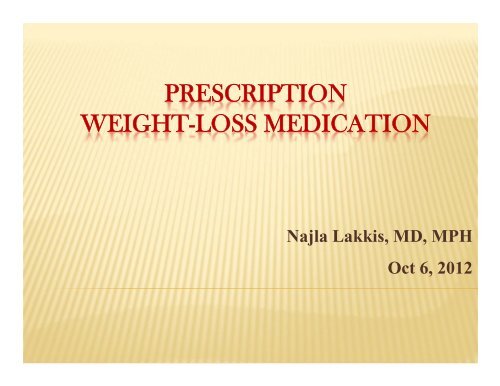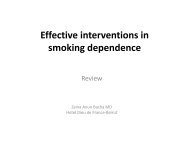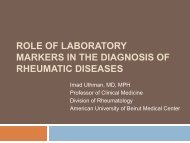Obesity Medications
Obesity Medications
Obesity Medications
You also want an ePaper? Increase the reach of your titles
YUMPU automatically turns print PDFs into web optimized ePapers that Google loves.
PRESCRIPTION<br />
WEIGHT-LOSS MEDICATION<br />
Najla Lakkis, MD, MPH<br />
Oct 6, 2012
Epidemy of <strong>Obesity</strong><br />
Lebanon: the prevalence of overweight and obesity<br />
in the adults aged ≥ 20 years reached 37.0% and<br />
11.0% respectively in 2009 compared to 37.0% and<br />
7.3% in 1997.<br />
U.S. population: 1/3 of adults are overweight and<br />
another 1/3 are already obese.<br />
Nasreddine L. et al. BMC Public Health 2012, 12:798
Epidemy of <strong>Obesity</strong> in Lebanon by Age/Gender<br />
Nasreddine L. et al. BMC Public Health 2012, 12:798
Excessive Body Weight<br />
Physical & Psychologic Complications<br />
<br />
<br />
<br />
<br />
<br />
<br />
<br />
<br />
<br />
<br />
<br />
<br />
<br />
<br />
Hypertension<br />
Dyslipidemia<br />
Type 2 diabetes mellitus<br />
Heart disease<br />
Stroke<br />
Certain types of cancer (endometrial, breast, prostate, colon)<br />
Gallbladder disease<br />
Sleep apnea and other respiratory problems<br />
Reduced fertility<br />
Osteoarthritis<br />
Increase in all-cause mortality<br />
Emotional distress<br />
Discrimination<br />
Social stigmatization<br />
http://www.aafp.org/afp/2001/0601/p2185.html
PRESCRIPTION WEIGHT LOSS MEDICATIONS<br />
They are indicated, as per the FDA, as<br />
an adjunct to<br />
a reduced-calorie diet & exercise for<br />
chronic weight management with<br />
initial BMI ≥ 27 kg/m 2<br />
with at least 1 weight-related<br />
comorbid condition<br />
(eg, HTN, DM, dyslipidemia).
REMEMBER -SERIES OF FDA REJECTIONS<br />
Weight loss drugs in general have not had a great track record for safety.<br />
<br />
<br />
<br />
<br />
.<br />
Fenfluramine+Phentermine combination and Dexfenfluramine were<br />
withdrawn from the market in 1997 due to heart valve damage…<br />
Rimonabant was formally rejected by the FDA in 2007(risk of serious<br />
psychiatric problems and even suicide).<br />
Sibutramine was also pulled from pharmacy shelves in 2010 due to<br />
concerns about heart problems (↑cardiovx events & strokes).<br />
The FDA also formally rejected:<br />
Lorcaserin from Arena Pharmaceuticals in October 2010.<br />
Phentermine + Topiramate ER (Qnexa) from Vivus in October 2010.<br />
Bupropion+ Naltrexone (Contrave) from Orexigen Therapeutics in Feb 2011.<br />
The FDA asked the maker of Contrave, to check for heart attack or<br />
other cardiovascular risks by conducting a “randomized, double-blind,<br />
placebo-controlled trial .<br />
.
LORCASERIN<br />
HYDROCHLORIDE<br />
marketed as Belviq (BEL-VEEK) in the US<br />
made by Arena Pharmaceuticals<br />
Rejected by the FDA in October 2010 (because of concerns of an increased<br />
CARDIOVX risk of heart disease and stroke among users)<br />
Approved by the FDA in June 2012
LORCASERIN: Mechanism of Action<br />
It is a SELECTIVE serotonin 2C (5-HT2C) receptor<br />
agonist— It activates brain receptors for serotonin, a<br />
neurotransmitter that triggers feelings of satiety and<br />
satisfaction.<br />
At dosages intended for weight loss, it does not<br />
significantly turn on different serotonin switches<br />
responsible for the effects of hallucinogens (such<br />
as LSD) and addictive drugs of abuse.<br />
Higher doses may trigger these switches.<br />
Fryhofer S. Sep 2012. http://www.medscape.com/viewarticle/770264<br />
Astrup A. & Pedersen S. Jun 2012. http://www.medscape.com/viewarticle/766467.
LORCASERIN: Dosage Forms & Strengths<br />
Belviq 10-mg tablets Once to BID ± food.<br />
It will become available in the US by early 2013.<br />
It has a potential for abuse... It will be a controlled<br />
substance…<br />
http://www.rxlist.com/belviq-drug/indications-dosage.htm
LORCASERIN: Dose Adjustment<br />
Renal impairment<br />
Mild (CrCl 30-60 mL/min): No dosage adjustment required<br />
Moderate (CrCl 15-30 mL/min): Use caution<br />
Severe (CrCl 9): Use caution
CHILD-PUGH SCORE<br />
The score employs five clinical measures of liver disease. Each measure is<br />
scored 1-3, with 3 indicating most severe derangement.
LORCASERIN: How Well Does It Work?<br />
One should expect at least 5% body weight loss<br />
overall. If this result isn't evident after taking it for<br />
3 months, the patient should stop the drug.<br />
Clinical trials have shown that Lorcaserin produces<br />
about 4 kg of weight loss over a 1-year period<br />
compared with placebo, with some sustained weight<br />
loss benefit after 2 years of treatment.<br />
Thus, the weight loss seen with Lorcaserin is slightly<br />
greater than that seen with Orlistat, which provides 2-<br />
3 kg of placebo-subtracted weight loss.<br />
Fryhofer S. Sep 2012. http://www.medscape.com/viewarticle/770264<br />
Astrup A. & Pedersen S. Jun 2012. http://www.medscape.com/viewarticle/766467<br />
Fidler MC, et al. J Clin Endocrinol Metab. 2011;96:3067-3077
LORCASERIN in persons with Type 2 DM<br />
It improves glycemic control (A1c ↓ by 1%) in<br />
addition to facilitating weight loss (5%).<br />
It has modestly beneficial effects on Lipids & BP.<br />
Symptomatic hypoglycemia occurred in 7.4% of<br />
patients on Lorcaserin twice daily, 10.5% on<br />
Lorcaserin once daily, and 6.3% on Placebo.<br />
In this clinical trial, all patients were concomitantly<br />
using a sulfonylurea (±metformin). Lorcaserin has<br />
not been studied in patients taking Insulin.<br />
Astrup A. & Pedersen S. Jun 2012. http://www.medscape.com/viewarticle/766467<br />
O'Neil PM, et al. <strong>Obesity</strong>. 2012. doi: 10.1038/oby.2012.66.
LORCASERIN: Limitations of Use -1-<br />
The safety and efficacy of coadministration of Lorcaserin<br />
with other products intended for weight loss including<br />
prescription drugs (e.g., Phentermine), OTDs, and herbal<br />
preparations have not been established.<br />
The effect of Lorcaserin on cardiovx morbidity&mortality<br />
has not been established.<br />
N.B. Preliminary data suggest that 5HT2B receptors may be<br />
overexpressed in CHF…<br />
The FDA is requiring 6 postmarketing studies, including a<br />
long-term cardiovx trial to evaluate risk for heart attack and<br />
stroke.<br />
http://www.rxlist.com/belviq-drug.htm<br />
Astrup A. & Pedersen S. Jun 2012. http://www.medscape.com/viewarticle/766467
LORCASERIN: Limitations of Use -2-<br />
Risk of Serotonin Syndrome or Neuroleptic Malignant Syndrome<br />
(NMS)-like reactions if combined with:<br />
1. Serotonergic medications, including:<br />
SSRIs & SNRIs<br />
2. Drugs that may affect the serotonergic neurotransmitter systems<br />
Triptans,<br />
MAOIs<br />
TCAs<br />
Lithium<br />
Bupropion<br />
Tramadol<br />
Tryptophan<br />
St. John's Wort<br />
Antipsychotics or other dopamine antagonists….<br />
http://www.rxlist.com/belviq-drug.htm
LORCASERIN: Limitations of Use -3-<br />
Lorcaserin should be used with caution in men who<br />
have conditions that might predispose them to<br />
priapism (e.g., sickle cell anemia, multiple myeloma, or<br />
leukemia), or in men with anatomical deformation of<br />
the penis (e.g., angulation, cavernosal fibrosis, or<br />
Peyronie's disease).<br />
There is limited experience with the combination of<br />
Lorcaserin & medication for erectile dysfunction (e.g.,<br />
phosphodiesterase 5 inhibitors). Therefore, the<br />
combination with these medications should be used<br />
with caution.<br />
http://www.rxlist.com/belviq-drug.htm
LORCASERIN: Contra-Indications<br />
Pregnancy & ?Breastfeeding<br />
Children < 18year old (not studied yet)<br />
Patient with Severe Renal Failure.<br />
Patients on Serotonergic <strong>Medications</strong>.<br />
Patients with CHF or hemodynamically-significant<br />
VHD.<br />
Patient who have conditions that might<br />
predispose them to priapism.<br />
http://www.rxlist.com/belviq-drug/overdosage-contraindications.htm
Lorcaserin: Adverse Effects-common<br />
>10% % C % P<br />
Headache 16.8 10.1<br />
URTI 13.7 12.3<br />
Nasopharyngitis 13.0 12.0<br />
1-10% % %<br />
Dizziness 8.5 3.8<br />
Nausea 8.3 5.3<br />
Fatigue 7.2 3.6<br />
Diarrhea 6.5 5.6<br />
UTI 6.5 5.4<br />
Back pain 6.3 5.6<br />
Constipation 5.8 3.9<br />
Dry mouth 5.3 2.3<br />
Vomiting 3.8 2.6<br />
Rash 2.1 1.8<br />
Musculoskeletal pain 2.0 1.4<br />
http://www.rxlist.com/belviq-drug/side-effects-interactions.htm
Lorcaserin: Adverse Effects-others<br />
Cognitive Impairment such memory problems and<br />
attention disturbance (1.9% c versus 0.5% p )<br />
Psychiatric Problems such as euphoria, hallucination,<br />
and dissociation (0.2% c versus
ATTENTION<br />
Monitor for serotonin syndrome or NMS-like reactions<br />
Studies suggest possibility of regurgitant VHD (not likely), monitor if<br />
patient has CHF<br />
Advise patient to take caution when operating hazardous machinery .<br />
Monitor for worsening of depression, suicidal thoughts or behavior, or<br />
any other unusual changes in mood or behavior<br />
Monitor for hypoglycemia with type 2 DM, if hypoglycemia occurs while<br />
on therapy, adjust antidiabetic drug regimen<br />
Caution in men with predisposed conditions to priapism (eg sickle cell<br />
anemia, multiple myeloma, or leukemia) or anatomical deformation of<br />
the penis<br />
Caution with bradycardia or a history of heart block<br />
May cause decrease in WBC count and other hematological changes,<br />
consider periodic monitoring of CBC<br />
Moderately elevates prolactin levels<br />
May cause pulmonary hypertension (insufficient data)
PHENTERMINE HYDROCHLORIDE<br />
+<br />
TOPIRAMATE EXTENDED-RELEASE<br />
marketed as Qsymia (kyoo-sim-EE-uh)<br />
made by Vivus Pharmaceuticals<br />
Rejected by the FDA in Oct 2010 (Qnexa) because it increased cardiovx risk<br />
Approval by the FDA in Jul 2012 (Qsymia)
Phentermine+Topiramate ER<br />
It is a combination of 2 currently approved drugs:<br />
The sympathomimetic amine anorectic Phentermine, the<br />
safer "phen" part of the infamously unsafe fen-phen diet<br />
drug combo. It triggers↑ release of Norepinephrine ↑<br />
Leptin in blood ↓ appetite<br />
The seizure/migraine drug Topiramate, that causes weight<br />
loss in several ways:<br />
increasing feelings of fullness<br />
making foods taste less appealing<br />
increasing calorie burning.
PHEN/TPM ER: Dosage Forms & Strengths<br />
<br />
<br />
<br />
<br />
Qsymia 3.75 mg/23mg (14 and 30 capsules),<br />
Qsymia 7.5 mg/46 mg (30 capsules),<br />
Qsymia 11.25 mg/69 mg (30 capsules),<br />
Qsymia 15 mg/92 mg (30 capsules).<br />
Start with 3.75 mg/23mg, and ↑ to the recommended dose<br />
7.5 mg/46 mg after 14 days. Evaluate weight loss after 12<br />
weeks before shifting to a higher dose…then 12 weeks…<br />
The combination is taken once a day in the morning ± food.<br />
Qsymia should become available by Sep 2012.<br />
<br />
It will be sold only through "certified pharmacies “ because<br />
women taking this medication must use birth control, and the<br />
drug Phentermine has a known potential for abuse.
PHEN/TPM ER: Dose Adjustment<br />
Renal impairment:<br />
Mild (≥50 mL/min): No dose adjustment required<br />
Moderate (30-49 mL/min) and severe (
PHEN/TPM ER: How Well Does It Work?<br />
2 year-long clinical trials (n≈3700 patients) reported<br />
6.7%-8.9% additional weight loss in patients taking<br />
Qsymia compared with those taking the placebo.<br />
After 3 months of treatment, one can expect at least:<br />
3% weight loss on lower doses<br />
5% weight loss on higher doses.<br />
If not, the drug should be stopped, but gradually:<br />
Discontinue Qsymia 15mg/92mg gradually by taking a dose<br />
every other day for at least 1 week prior to stopping<br />
treatment altogether, due to the possibility of precipitating a<br />
seizure.<br />
Gadde KM et.al. Lancet. 2011 Apr 16;377(9774):1341-52.
56-week Randomized Clinical Trial (EQUIP Trial)<br />
in Severely Obese Patients BMI≥35<br />
1.6%<br />
5.1%<br />
10.9%<br />
p < 0.0001<br />
Allisson D et.al. <strong>Obesity</strong> (Silver Spring). 2012 February; 20(2): 330–342.
56-week Randomized Clinical Trial (EQUIP Trial)<br />
in Severely Obese Patients BMI≥35<br />
The 15/92 group had significantly greater changes<br />
relative to placebo for WC, SBP & DBP, FBS, TGs, T.<br />
Cholesterol, LDL-C, & HDL-C.<br />
Allisson D et.al. <strong>Obesity</strong> (Silver Spring). 2012 February; 20(2): 330–342.
PHEN/TPM ER: Limitations of Use<br />
The safety and effectiveness of Qsymia in combination with<br />
other products intended for weight loss, including<br />
prescription and OTC drugs and herbal preparations have<br />
not been established.<br />
The effect of Qsymia on cardiovx morbidity&mortality has<br />
not been established. The FDA is requiring Qsymia<br />
manufacturer Vivus, Inc. to conduct 10 postmarketing studies,<br />
including 1 long-term study specifically looking at cardiovx<br />
events, including heart attack and stroke.<br />
•Lauer MS. Lemons for obesity. Ann Intern Med. 2012,157:139-140.<br />
•Adamson Fryhofer S.- http://www.medscape.com/viewarticle/770262?src=mp
PHEN/TPM ER: Common Side Effects<br />
4 Clinical Trials Experience<br />
<br />
<br />
<br />
<br />
<br />
<br />
<br />
CNS: paresthesia*, headache*, dizziness*, dysgeusia, hypoesthesia,<br />
disturbance in attention<br />
Psychiatric: insomnia*, depression*, anxiety*<br />
GI: constipation*, dry mouth*, nausea, diarrhea, dyspepsia,<br />
heartburn<br />
General: fatigue, irritability*<br />
Eye Disorders: blurred vision*<br />
Infections: URTI, nasopharyngitis, sinusitis, bronchitis, UTI,<br />
gastroenteritis<br />
Laboratory Abnormalities: ↓CO2 content; ↓K + ; ↑ Creat<br />
Weight loss may ↑ the risk of hypoglycemia in patients with type 2 DM treated with<br />
insulin and/or insulin secretagogues.<br />
Weight loss may ↑ the risk of hypotension in patients on anti-hypertensive drugs.<br />
http://www.rxlist.com/qsymia-drug-center.htm<br />
http://www.fda.gov/downloads/Drugs/DrugSafety/UCM312590.pdf
Common Side Effects<br />
Post-Marketing<br />
Phentermine<br />
<br />
<br />
<br />
<br />
Allergic: Urticaria<br />
Cardiovx : ↑BP, Ischemic events<br />
CNS: Euphoria, Psychosis, Tremor<br />
Reproductive: Changes in libido, Impotence<br />
Topiramate<br />
Dermatologic: Bullous skin reactions (including erythema<br />
multiforme, Stevens-Johnson syndrome, toxic epidermal necrolysis),<br />
Pemphigus<br />
Gastrointestinal: Pancreatitis<br />
<br />
<br />
<br />
Hepatic: Hepatic failure (including fatalities), Hepatitis<br />
Metabolic: Hyperammonemia Hypothermia<br />
Ophthalmic: Maculopathy<br />
http://www.rxlist.com/qsymia-drug-center.htm
DRUG-DRUG INTERACTION<br />
<br />
<br />
<br />
<br />
<br />
<br />
MAOIs.<br />
Carbonic Anhydrase Inhibitor (e.g., zonisamide, acetazolamide, or<br />
dichlorphenamide).<br />
OCPs: increased exposure to the progestin and lower exposure to the<br />
estrogen irregular bleeding (spotting)<br />
CNS Depressants (barbiturates, benzodiazepines, sleep medications)<br />
including Alcohol: may potentiate CNS depression such as dizziness<br />
or cognitive adverse reactions, or other centrally mediated effects of<br />
these agents.<br />
Non- K + Sparing Diuretics: ↓ K + (Monitor K + level).<br />
Antiepileptic Drugs:<br />
Carbamazepine or Phenytoin ↓ plasma concentrations of<br />
topiramate by 40-48%<br />
Valproic A. hyperammonemia ± encephalopathy.<br />
hypothermia ± hyperammonemia
Warnings & Precautions<br />
Fetal Toxicity (Topiramate in T1: Cleft Lips ± Palate).<br />
↑ in HR, so HR monitoring is recommended.<br />
Suicidal Behavior and Ideation (Topiramate)<br />
Acute Myopia and Secondary Angle Closure Glaucoma<br />
Mood and Sleep Disorders (++Avoid Alcohol intake)<br />
Cognitive Impairment e.g., impairment of concentration,<br />
difficulty with memory, and speech or language problems,<br />
particularly word-finding difficulties).<br />
Metabolic Acidosis<br />
http://www.rxlist.com/qsymia-drug-center.htm
Contre-Indications<br />
Hypersensitivity to sympathomimetic amines<br />
Pregnancy or Planning for Pregnancy or no effective<br />
Contraception method<br />
Unstable heart disease or stroke<br />
Glaucoma<br />
Hyperthyroidism<br />
Severe Liver Failure<br />
Use of Phentermine is contraindicated during or within 14<br />
days following MAOIs -- risk for hypertensive crisis<br />
Use of Topiramate is contraindicated during Carbonic<br />
Anhydrase Inhibitor due to risk of metabolic acidosis and<br />
risk of kidney stone formation.<br />
http://www.fda.gov/downloads/Drugs/DrugSafety/UCM312590.pdf
ORLISTAT<br />
Modest weight loss<br />
an average of 2.9 kg at 1 to 4 years<br />
Little information on its effect on longer-term complications of<br />
obesity<br />
Rucker D et al. BMJ 2007, 335 (7631): 1194–99.<br />
Wood S. Medscape News. Retrieved 26 April 2011.
ORLISTAT: Story with the FDA<br />
1999: The FDA approved Orlistat capsules as a prescription<br />
drug to treat obesity.<br />
2007: The FDA approved Orlistat capsules (60mg) as<br />
an OTC weight loss aid for overweight adults. Orlistat<br />
capsules (120mg) remained a prescription drug for obesity<br />
in the USA.<br />
2010: new FDA safety information about cases of severe<br />
liver injury with hepatocellular necrosis or acute hepatic<br />
failure that have been reported rarely (n=13) with the use<br />
of this medication (60mg and 120mg). Some of these cases<br />
resulting in liver transplant (n=3) or death (n=2).<br />
http://www.fda.gov/NewsEvents/Newsroom/PressAnnouncements/2007/ucm108839.htm
ORLISTAT: Mechanism of Action<br />
It inhibits gastric and pancreatic lipases TGs from the<br />
diet are not hydrolyzed into absorbable free fatty acids,<br />
and are excreted undigested instead.<br />
Only trace amounts are absorbed systemically.<br />
It prevents approximately about 25% (60mg TID) to 30%<br />
(120mg TID) of dietary fat from being . Higher<br />
doses do not produce more potent effects.
ORLISTAT: Dosage Forms & Stengths<br />
Orlistat 60mg (Alli -GSK) TID<br />
Orlistat 120mg (Xenical -Roche) TID<br />
with each main meal containing fat<br />
(during or up to 1 hour after the meal)
ORLISTAT: How Well Does It Work?<br />
The weight loss achieved with Orlistat varies. In 1-<br />
year clinical trials:<br />
35.5%-54.8% achieved 5% or greater decrease in BMI 16.4%-<br />
24.8% achieved at least a 10% decrease in BMI<br />
After Orlistat was stopped, a significant no. of subjects<br />
regained up to 35% of the weight they had lost.<br />
The incidence of T2DM in an obese population over<br />
4 yrs is decreased with Orlistat (6.2%) compared to<br />
placebo (9.0%). *<br />
Long-term use of Orlistat also leads to a modest<br />
reduction in BP. ** *Torgerson J et al. Diabetes Care 2004, 27 (1): 155–61.<br />
**Siebenhofer A et al. Cochrane Database Syst Rev 2009, 8 (3): CD007654.
ORLISTAT: Common Side Effects<br />
Clinical Trials Experience<br />
High rates of GI side effects: oily stool / spotting,<br />
passing gas with oily discharge, stool incontinence,<br />
diarrhea, nausea/vomiting<br />
↓ absorption of fat soluble vitamins (D, E, K) & betacarotene—better<br />
to take supplements once a day at least<br />
2 hrs before or after the administration of Orlistat, such<br />
as at bedtime.<br />
Rare cases of hypersensitivity: pruritus, rash, urticaria,<br />
angioedema, bronchospasm and anaphylaxis. Very rare<br />
cases of bullous eruption.<br />
http://www.rxlist.com/xenical-drug.htm
ORLISTAT: Side Effects<br />
Postmarketing Surveillance<br />
↑ risk for severe liver injury.<br />
↑ in transaminases & alk. Phosphatase.<br />
↑ risk for gall stones.<br />
↑ risk for the development of kidney stones<br />
(oxalate-induced acute kidney injury).<br />
↑ risk for acute kidney injuries.<br />
↑ risk for acute Pancreatitis.<br />
Wood S. Medscape News. Retrieved 26 April 2011<br />
http://www.rxlist.com/xenical-drug.htm
ORLISTAT: Drug-Drug Interactions<br />
It can impair absorption of:<br />
Vit K: ↑ INR in patients on Orlistat & Warfarin.<br />
Levothyroxine: administer it at least 4 hrs before Orlistat.<br />
Cyclosporine: administer it 3 hrs after Orlistat.<br />
Amiodarone.<br />
http://www.rxlist.com/xenical-drug/indications-dosage.htm
ORLISTAT: Contre-indications<br />
<br />
<br />
<br />
<br />
<br />
<br />
<br />
<br />
<br />
Pregnancy. It is not known if Orlistat passes into breast milk.<br />
Hypersensitivity to Orlistat or to any of its components<br />
Chronic Malabsorption Syndrome.<br />
Gallbladder problem (cholestasis) or Reduced gallbladder function<br />
(e.g. after cholecystectomy).<br />
Impaired Liver Function.<br />
Pancreatic Disease.<br />
Kidney stones/problems (such as calcium oxalate kidney stones,<br />
hyperoxaluria).<br />
Organ Transplant.<br />
Anorexia Nervosa/Bulimia.
BUPROPION+ NALTREXONE<br />
marketed as Contrave<br />
made by Orexigen Therapeutics
BUPROPION+ NALTREXONE<br />
Both drugs have been on the market for about 25<br />
yrs.<br />
Bupropion, commonly prescribed to treat depression<br />
and also approved to help people quit smoking,<br />
curbs the appetite.<br />
Naltrexone, an opioid blocker, approved to treat<br />
opioid and alcohol addictions, amplifies the effect of<br />
Bupropion on the appetite.<br />
Most patients taking this combination in clinical<br />
trials lost about 4.2-5.0% of their starting body<br />
weight compared to those taking a placebo, which is<br />
below the FDA standard of 5%.
BUPROPION+ NALTREXONE<br />
Dec 7, 2012<br />
An FDA advisory committee voted 13 to 7 to<br />
recommend approval of Contrave.<br />
But many of the FDA committee members<br />
expressed concern about:<br />
1. the drug's impact on cardiovascular health (↑BP)<br />
2. The lack of data that give any clues about the<br />
drug's safety or efficacy beyond the one-year mark<br />
for a long-term health condition.
BUPROPION+ NALTREXONE<br />
Feb. 1, 2011<br />
The FDA has decided not to approve the weight loss<br />
drug Contrave.<br />
The FDA issued a response letter that asks Orexigen<br />
Therapeutics, the maker of Contrave, to check for<br />
heart attack or other cardiovascular risks by<br />
conducting a “randomized, double-blind, placebocontrolled<br />
trial.”








